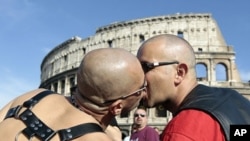The United Nations Human Rights Council has adopted an historic resolution that seeks to give gays and lesbians rights equal to those enjoyed by heterosexuals. The resolution passed by a narrow margin and over the vigorous objections of African and Arab countries.
After a long debate, the critical vote was taken.
The overflow audience burst out into applause before the president of the U.N. Human Rights Council, Sihasak Phuangketkeow, had a chance to announce the results of the vote. A giant video screen showed the final tally was 23 votes in favor of ending discrimination against gays, lesbians, bisexual and transsexual people, 19 against and three abstentions.
The Obama administration has been a staunch supporter of the resolution, and U.S. Ambassador Eileen Chamberlain Donahoe said the United States is thrilled by the outcome of what she called this simple but historic resolution.
“Today, we have taken an important step forward in our recognition that human rights are indeed universal," Donohoe said. "We recognize that violence against a person because of who they are is wrong. The right to choose, who we love and to share life with those we love is sacred. Further, we send the unequivocal message that each human being deserves equal protection from violence and discrimination. Today, we make history in the fight for basic fairness and equality.”
But not all countries were as upbeat or thrilled with the outcome. Arab and African states strongly opposed the resolution. Pakistan's ambassador to the United Nations in Geneva, Zamir Akram, speaking on behalf of the Organization of the Islamic Conference, said the OIC was seriously concerned that the Council was discussing controversial notions of sexual orientation.
He added there was no legal basis in any international human rights instruments for dealing with individual sexual interest and behavior at the United Nations.
The Nigerian representative, speaking on behalf of the African group, was particularly scathing and critical of South Africa, which was the main sponsor of the resolution. Ositadinna Anaedu accused South Africa of breaking ranks with the African region and siding with the West.
He said African countries oppose racism and discrimination, but quoting the Nigerian president he said individual and national rights are not a matter for international concern.
“Strongly rejects any attempts to undermine international human rights system by seeking to impose concepts by turning to social matters including private, individual conduct that fall outside the internationally agreed human rights legal work," Anaedu said. "Taking into account that such attempts constitute an expression of disregard for the universality of human rights.”
Despite this criticism, South Africa remained resolute in its conviction that all people are equal and deserve equal rights.
The resolution states “no one should be subject to discrimination or violence due to sexual orientation or gender identity.”
It expresses grave concerns at acts of violence and discrimination, in all regions of the world against gay, lesbian, bisexual and transgender individuals. The resolution also commissions a study on discriminatory laws and violence against individuals based on their sexual orientation and gender identity.
News
UN Council Adopts Historic Resolution Supporting Equal Rights for Gays
- By Lisa Schlein







